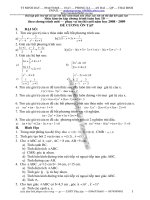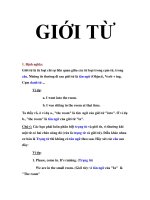Bài đọc 8.2. Trade Negotiating : Notes for Zoom Lecture Fulbright University (Chỉ có bản tiếng Anh)
Bạn đang xem bản rút gọn của tài liệu. Xem và tải ngay bản đầy đủ của tài liệu tại đây (117.37 KB, 1 trang )
<span class='text_page_counter'>(1)</span>Prof. Joseph Massey Trade Negotiating : Notes for Zoom Lecture Fulbright University 8.7.21 General principles Goal : not to get to yes but to secure your objective Be able and prepared to walk away: a bad agreement is worse than no agreement; have a BATNA Know what opponent can give and what can’t give Give to get, but better to: Give less to get more; keep rest for next negotiation, (governments like businesses have relationships over time) Give symbols for substance (MFN); not all values are economic Give later than sooner, get sooner than later (time is money) No such thing as progress in a negotiation Everything’s on the table until the whole deal is signed Everything’s off the table if deal is not sealed or honored Negotiate from your own draft Use your own interpreter Negotiate in your own language Language is the devil in the details Specific character of government to government negotiations Venue: Multilateral (WTO) Plurilateral (TPP) Bilateral Trade negotiations are always three negotiations in one: seek, get, accept US Interagency process: white and black hats Agency views: OMB, Departments of Commerce, Treasury, State, Justice, Labor,etc Industry, Congress and other “externalities” Role of stakeholders: producers (exporters), consumers, workers, importers the “geopolitical” and domestic political environments Government to Government US-China trade negotiation specifics China late to international system: GATT (WTO), IP conventions, others Developing country exemption from some WTO rules Values difference: Intellectual Property; “Emperor is Far Away” Exceptionalism “oldest civilization”; “invented paper, gunpowder,” etc Formalistic: “equality and mutual benefit”; “hurt the feelings of the Chinese people” Shame as lever Using US domestic allies; inept to begin with, better later, not as effective as Japanese Japan specific negotiations: 3 fundamental Japanese trade myths Poverty: “small country with no resources can’t import finished goods” Quality: “everything we make is better than anything you make” Lazy foreigner “You don’t learn our language or tailor your goods to us”.
<span class='text_page_counter'>(2)</span>









